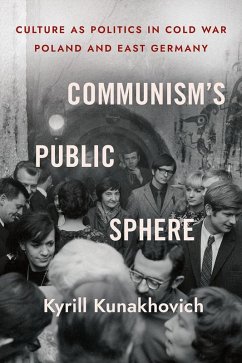Communism's Public Sphere explores the political role of cultural spaces in the Eastern Bloc. Under communist regimes that banned free speech, political discussions shifted to spaces of art: theaters, galleries, concert halls, and youth clubs. Kyrill Kunakhovich shows how these venues turned into sites of dialogue and contestation. While officials used them to spread the communist message, artists and audiences often flouted state policy and championed alternative visions. Cultural spaces therefore came to function as a public sphere, or a rare outlet for discussing public affairs.
Focusing on Kraków in Poland and Leipzig in East Germany, Communism's Public Sphere sheds new light on state-society interactions in the Eastern Bloc. In place of the familiar trope of domination and resistance, it highlights unexpected symbioses like state-sponsored rock and roll, socialist consumerism, and sanctioned dissent.
By examining nearly five decades of communist rule, from the Red Army's arrival in Poland in 1944 to German reunification in 1990, Kunakhovich argues that cultural spaces played a pivotal mediating role. They helped reform and stabilize East European communism but also gave cover to the protest movements that ultimately brought it down.
Focusing on Kraków in Poland and Leipzig in East Germany, Communism's Public Sphere sheds new light on state-society interactions in the Eastern Bloc. In place of the familiar trope of domination and resistance, it highlights unexpected symbioses like state-sponsored rock and roll, socialist consumerism, and sanctioned dissent.
By examining nearly five decades of communist rule, from the Red Army's arrival in Poland in 1944 to German reunification in 1990, Kunakhovich argues that cultural spaces played a pivotal mediating role. They helped reform and stabilize East European communism but also gave cover to the protest movements that ultimately brought it down.
Dieser Download kann aus rechtlichen Gründen nur mit Rechnungsadresse in A, D ausgeliefert werden.









